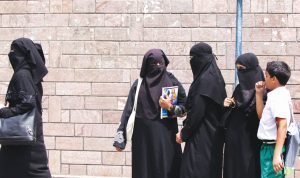 On June 12, the Cabinet cleared a fresh bill to ban the practice of instant triple talaq. The bill is introduced in the Budget session of Parliament which began on June 17 to replace an ordinance issued in February by the previous BJP-led NDA government.
On June 12, the Cabinet cleared a fresh bill to ban the practice of instant triple talaq. The bill is introduced in the Budget session of Parliament which began on June 17 to replace an ordinance issued in February by the previous BJP-led NDA government.
With the dissolution of the 16th Lok Sabha last month, the previous bill had lapsed as it was pending in Rajya Sabha. The Muslim Women (Protection of Rights on Marriage) Bill, which made the practice of instant triple talaq (talaq-e-biddat) a penal offence, had faced objections from the opposition parties which claimed that jail term for a man for divorcing his wife was legally untenable.
According to Union Minister Prakash Javadekar said the proposed legislation is based on gender equality and is part of the government’s philosophy of ‘SabkaSaath, Sabka Vikas, Sabka Vishwas’. The new bill will be a copy of the ordinance in force and the minister hoped that it will be passed “unanimously” by Rajya Sabha, where the government lacks numbers.
Bills that are introduced in Rajya Sabha and are pending there do not lapse with the dissolution of Lok Sabha. However, bills passed by Lok Sabha and pending in Rajya Sabha lapse with the dissolution of the Lower House. The government had promulgated the ordinance on triple talaq twice — in September 2018 and in February 2019 —. as the contentious bill remained pending in Rajya Sabha, though it was passed by Lok Sabha.
Under the Muslim Women (Protection of Rights on Marriage) Ordinance, 2019, divorcing through instant triple talaq is illegal, void and will attract a jail term of three years for the husband. Seeking to allay fears that the proposed law could be misused, the government has included certain safeguards in it such as adding a provision for bail for the accused during trial.
These amendments were cleared by the Cabinet on August 29, 2018. While the ordinance makes it a “non-bailable” offence, an accused can approach a magistrate even before trial to seek bail. In a non-bailable offence, bail cannot be granted by police at the police station itself. A provision was added to allow the magistrate to grant bail “after hearing the wife”, the government had said.
The Muslim Women (Protection of Rights on Marriage) Bill, 2019, which would replace the Muslim Women (Protection of Rights on Marriage) Second Ordinance, 2019, once passed, would put a curb on the practice of talaq-e-biddat, or instant triple talaq. “‘SabkaSaath, Sabka Vikas, Sabka Vishwas’ has been the pivot of NDA government lead by Prime Minister Narendra Modi,” the Centre said in a statement, adding that the government had fulfilled one of its promises.
“The Bill would ensure gender equality and gender justice to Muslim women. The Bill would also help in protecting the rights of married Muslim women and prevent divorce by practice of ‘talaq-e-biddat’ by their husbands. The Bill will be introduced in the forthcoming session of the Parliament,” the Centre said.
The Bill had been introduced in Parliament in 2018 but had lapsed with the dissolution of the 16th Lok Sabha. The Bill declares the practice of triple talaq void and illegal, making it punishable by three years in jail and a fine. It also provides for payment of subsistence allowance to married Muslim women and dependent children.
Taking forward decisions made in the last months of the previous NDA government, the Centre has decided to introduce a Bill on faculty recruitment in central educational institutions in the coming session of Parliament. The legislation would provide for 10% reservation for economically weaker sections (EWS) and restore an older system of reservation which would allow full representation of Scheduled Castes, Scheduled Tribes and Other Backward Classes.
The Central Educational Institutions (Reservation in Teachers’ Cadre) Bill, 2019, was approved by the Cabinet on Wednesday, and will allow filling up of more than 7,000 existing vacancies by direct recruitment, according to an official statement.
The Bill will replace an ordinance approved by Cabinet in March, just before the Lok Sabha elections, which restored the earlier “200-point roster system” considering the university or college as a single unit for the purpose of faculty reservations. This had been a long-standing demand of Dalit and Adivasi activists and political parties, with a threat of electoral consequences if denied.
They had complained that the “13-point roster system” considering each department as a separate unit, which was mandated by a controversial Allahabad High Court judgement in April 2018 and upheld by the Supreme Court in January 2019, effectively made reservations negligible.
The new Bill will also pave the way for implementation of the 103rd Constitutional Amendment passed by Parliament in January, mandating a 10% quota in jobs and educational institutions to economically backward sections in the general category. This is over and above the older reservations for SC, ST and OBC communities.
The new Bill is “expected to improve the teaching standards in the higher educational institutions by attracting all eligible talented candidates belonging to SCs/STs/SEBCs/EWS” categories, the government said.
The Cabinet also approved a two-month extension to the commission for examining sub-categorisation of Other Backward Classes (OBCs) so that it could consult States and Union Territories on the issue before submitting its report. The commission, headed by retired Delhi High Court Chief Justice G. Rohini, has been given six extensions, including the latest one. The commission’s tenure has been extended till July 31.
“The extension of the tenure of the commission would enable it to evaluate the issue of sub-categorisation of OBCs in the Central list based on wider consultations with various stakeholders. It will enable the commission to submit a comprehensive report on the issue,” the government said in a statement. Formed in 2017, the commission is looking at the issue of distribution of benefits of reservation among communities in the OBC category.
In the first session of the 17th Lok Sabha, the new government plans to convert 10 ordinances, including the one to ban the practice of instant triple talaq, into law. The ordinances were issued in February-March this year by the previous government as these could not be converted into Acts of Parliament in the last session of the 16th Lok Sabha.
Since the Narendra Modi government returned to power in the recently held elections, it has decided to give a fresh push to these proposed laws in the newly-constituted Lok Sabha. These ordinances will have to be converted into laws within 45 days of the beginning of the session, else they will lapse.
letters@tehelka.com













